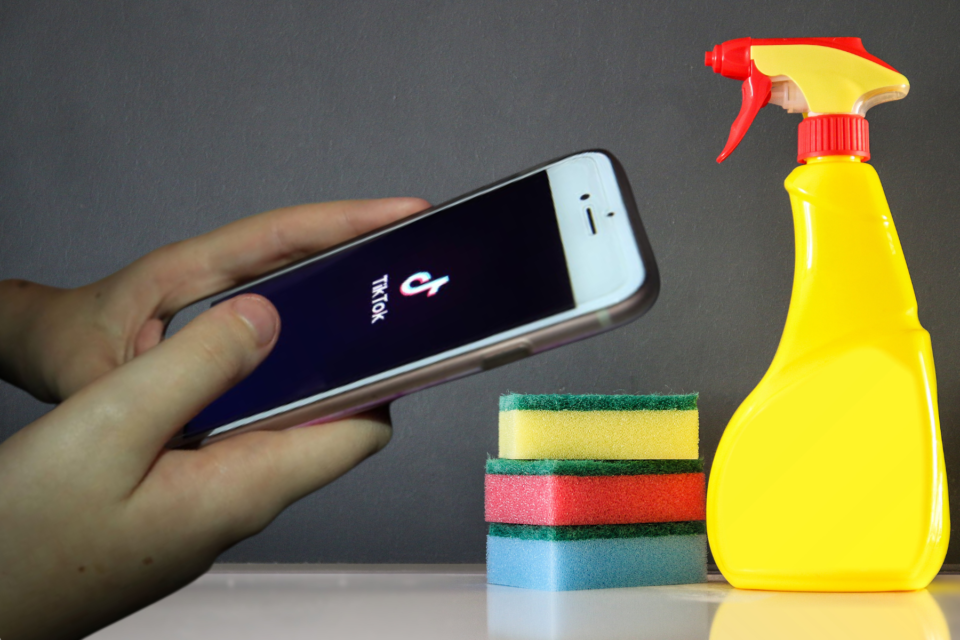TikTok has become a popular platform not just for entertainment purposes but also for educational purposes. Many TikTok users share tips on just about every subject: home organization, beauty and skincare, DIY projects, and even math, among many others. But one area that’s gaining a lot of traction is home cleaning.
Since 2020, more people have become “neat freaks.” This is certainly not a bad idea during the time of a pandemic. Cleanliness is important in reducing one’s risk of contracting COVID-19, as well as other illnesses.
In January 2021, the average monthly spending on cleaning supplies rose to $19.41, higher than the $17.30-dollar monthly average in January 2019. Many cleaning businesses have also emerged in the past year due to the demand.
Many people get cleaning tips and hacks from TikTok, given its popularity. But many cleaning hacks shared on this platform are from people who aren’t exactly professional cleaners. Granted, not everyone needs to be an expert to share tips with others. They can share things they learned from experience that they feel others will also find helpful.
But just because a video went viral on TikTok doesn’t mean that you should immediately trust it. Here’s why:
Dangerous Hacks
Some cleaning hacks on TikTok are dangerous. A perfect example is a life hack that went viral where someone used a mix of bleach and dish soap to unclog their kitchen sink. On the surface, this hack may seem really helpful. Some users even commented on the original post that they tried it themselves, and the hack worked. But this tip can actually lead to terrible consequences.
According to a professional cleaner, pouring a bleach-and-soap solution into your kitchen drain is dangerous. The reaction between the bleach and the chemicals present in the drain can summon toxic fumes.
In addition, dish soap has ammonia. And when it’s mixed with bleach, the solution can be threatening. The combination of bleach and ammonia releases chloramine gas that is toxic to both humans and animals. Deaths caused by this toxic gas are rare, but the threat is still there and shouldn’t be ignored.
Costly Damage
People love life hacks for many reasons. One is saving money. If you learn how to fix certain things at home, you won’t have to hire someone to do it for you.
But if you use the wrong hack, you might end up spending even more. For instance, there’s a TikTok video about cleaning grout using bleach. A bottle of bleach is affordable, so it’s understandable why people would choose to follow this tip when they clean their homes. But bleach can damage and ruin the grout. This can set them back around $200 to $400 in repair cost.
So if you’re unsure how to clean areas in your home, you might as well enlist the help of professionals. For example, cleaning the dryer vent is an essential chore, especially if you wash big loads of laundry often. Hiring someone to do it for you will reduce your risk of damage and ensure that the area is professionally cleaned. This way, you get your money’s worth.
No Credibility
Not everyone who shares tips online is credible. Consider users who talk about psychology on social media. Some share ideas about how the brain works or how relationships work. And they present these ideas as if they are facts, even if they’re not. Fortunately, a psychology professor decided to make their own TikToks and debunk the misinformation plaguing the platform.
The same can be said with cleaning hacks on the platform. The intent of the people who share these hacks may be to help others. But if they misinform themselves, they don’t exactly help people and might even cause them damage.
What to Do Instead
It can’t be denied that the hacks and tips shared by many users on TikTok can be very helpful. But just because you see one credible hack within the platform doesn’t mean that every other hack you find on it is also trustworthy.
Thus, the next time you see a cleaning hack that’s gaining popularity, you shouldn’t follow it blindly and do some fact-checking. Search the hack on Google and see what blog articles say about it. You can also check the blogs of cleaning companies as they usually share tips as well. These blogs would relatively be much more credible than a social media user’s post. And remember that the number of likes and views on a social media post doesn’t always equate to trustworthiness.

